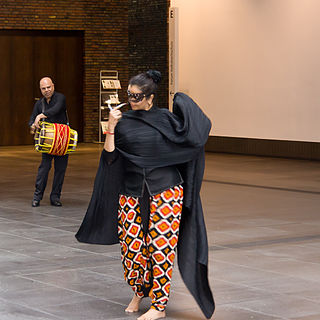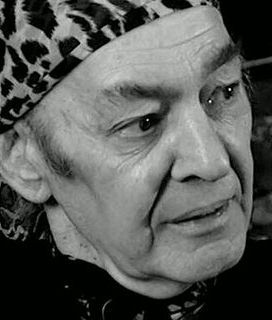
Can were a German experimental rock band formed in Cologne in 1968 by Holger Czukay, Irmin Schmidt (keyboards), Michael Karoli (guitar), and Jaki Liebezeit (drums). They featured several vocalists, including the American Malcolm Mooney (1968–70) and the Japanese Damo Suzuki (1970–73). They have been hailed as pioneers of the German krautrock scene.
Schneeball was a German record label founded in 1976.
Triumvirat was a West German progressive rock band from Cologne in then-West Germany. They became, during the 1970s, a key figure in Eurock, the progressive rock of continental Europe whose German variant is called krautrock. The name Triumvirat comes from the Latin word triumvirate, which refers to a group of three powerful individuals.

Amon Düül II are a German rock band formed in 1968. The group is generally considered to be one of the pioneers of the West German krautrock scene. Their 1970 album Yeti was described by British magazine The Wire as "one of the cornerstones of ... the entire Krautrock movement".

Phallus Dei is the debut album by German band Amon Düül II. The album was the result of the Amon Düül commune in Munich splitting. The album features layered guitars, abstract percussion, and chant-like vocals. It is often cited as the original Krautrock album.

Siegfried "Sigi" Schwab was a German guitar player and teacher, having performed on more than 15,000 recordings for film, television, and as an accompanist to various artists. He played in a wide variety of styles, including baroque and jazz. Schwab played in German groups like Et Cetera, Embryo, and with Ramesh Shotham. In 1980 Schwab played with Chris Hinze at the 5th North Sea Jazz Festival. Born in Ludwigshafen on 5 August 1940, Schwab died on 11 January 2024, at the age of 83.

Agitation Free is a German experimental krautrock band formed in 1967 by Michael "Fame" Günther, Lutz "Lüül" Ulbrich (guitar), Lutz Ludwig Kramer (guitar) and Christopher Franke (drums).
Dissidenten are a German rock band known for their collaborations with Middle Eastern, African and Indian musicians. In a 1988 article for The New York Times, music critic Stephen Holden acknowledged the band as being among the leaders of what he termed "the 'world beat' movement ... in which ethnic styles are contemporized with electronic dance rhythms".
Xhol Caravan, known first as Soul Caravan and later as Xhol, was one of the first bands to participate in the so-called Krautrock movement in Germany in the late 1960s. Their music draws from varied influences and fuses rhythm and blues and free jazz with a psychedelic rock sensibility.
Eruption was a short-lived German krautrock or experimental music super group founded by former Tangerine Dream member and then current Kluster member Conrad Schnitzler.

Marlon Klein is a musician and producer in the World Music and Fusion genres. He is a co-founder of the German group Dissidenten.

Lift are a German rock band formed in Dresden in 1973 and remains active at the present day.

Ramesh Shotham is a percussionist and drummer.

Roman Bunka was a German guitarist, oud player and composer, active in world music and jazz fusion bands. He lived most of his life in Munich, Bavaria, where he was involved in various musical crossover projects.

Christoph Karrer was a German guitarist and composer who also played saxophone, violin and oud.
Gila was a psychedelic rock band from Stuttgart, Germany.
Forgas Band Phenomena is a French instrumental progressive rock and jazz fusion band.

Got RIO? Romantic Warriors II: Special Features DVD is a 2013 documentary film and an addendum to the 2012 feature-length documentary Romantic Warriors II: A Progressive Music Saga About Rock in Opposition. The film was written and directed by Adele Schmidt and José Zegarra Holder, and was released in the United States by Zeitgeist Media. It was generally well received by critics, with a reviewer at AllMusic saying that it "is a showcase for tremendous musicianship and a must-have for existing [Rock in Opposition] fans".

Harald Grosskopf is a German electronic musician. He played with several Krautrock and progressive rock bands of the 1970s in Germany, and released solo music.
Tritonus was a German progressive rock band active between 1972 and 1979. The band was initiated by Peter K. Seiler, a German art-student, based on Emerson, Lake and Palmer, complete with heavy keyboards and English vocals.












